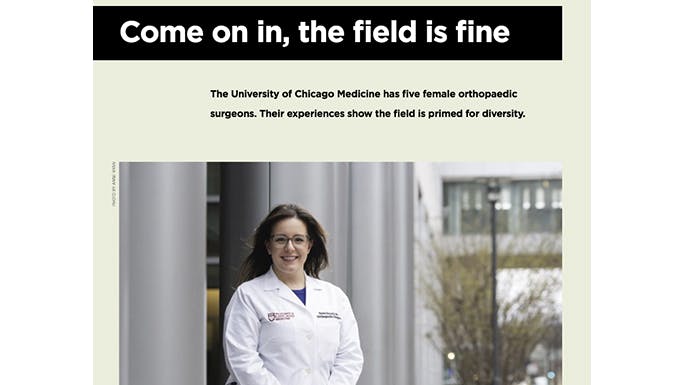Orthopaedic Care for Women
A Team Devoted to Women
The University of Chicago Medicine’s orthopaedic team is highly respected with orthopaedic surgeons holding leadership roles on local, regional and national levels. Our team has the skill, experience and specialized expertise needed to diagnose and treat everything from common strains and sprains to complex joint conditions.While nationally, only 5% of orthopaedic surgeons are women, at UChicago Medicine, 36% of our surgeons are women. This allows us to better understand the orthopaedic challenges women face and can relate on a more personal and impactful way with our patients.
Unique Approach to Orthopaedic Care
Our approach to high-quality orthopaedic care for women begins with recognizing the innate difference between men and women’s anatomy and hormones that may make women more susceptible to specific pain, injury or chronic conditions. Because we understand the distinct orthopaedic risk factors that increase the chances of injury in women, our team offers integrated preventive care as well as comprehensive, tailored medical, surgical and rehabilitation therapy treatment plans for their specific needs.
We provide a unique healthcare experience to each patient. One of the many ways we tailor our services for women is by having an all-female surgical and nonsurgical team. With targeted expertise in each orthopaedic specialty, such as foot and ankle, hand surgery, sports medicine and more, we deliver the individualized care you deserve for better mobility, flexibility and long-term stability so you can meet your personal healthcare goals.
Common Conditions Impacting Women
There are specific orthopaedic injuries that women are naturally more vulnerable to, so knowing those conditions and identifying an issue early can help put you on the path of recovery sooner. Common injuries or conditions include:
- Bunions
- Flat Foot
- Foot Deformities
- Fractures
- Plantar Fasciitis
- Colles’ (Wrist) Fracture
- De Quervain Tenosynovitis
- Carpal Tunnel Syndrome
- Thumb Arthritis
- Trigger Finger
- Hip Dysplasia
- Hip Impingement
- Bursitis
- Patellofemoral Syndrome
- Bone Tumors
- Soft Tissue Tumors
- Ganglion Cysts
- Shoulder Instability
- Frozen Shoulder
- Rotator Cuff Tears
- Female Athlete Triad (bone loss, menstrual problems, calorie depletion)
- Anterior Cruciate Ligament (ACL) Injury
- Bursitis
- Hip Impingement
- Ligamentitis (lax ligaments)
- Sprains and Strains
- Stress Fractures
- Bursitis
- Ligamentitis (lax ligaments)
- Osteoarthritis (including post menopause-related arthritis)
- Osteoporosis/Osteopenia (loss of bone health)
- Tendonitis
- Weight-Related Orthopaedic Conditions (such as joint, muscle and/or cartilage pain and deterioration)
Orthopaedic Symptoms and Risk Factors
There is no guarantee that each woman will experience the same symptoms or face the same risk factors. However, being aware of what can impact your overall bone health and taking active steps to eliminate or reduce your known risks can minimize your chances of more serious orthopaedic damage. Risk factors include:
- Weight-related joint pain: Weight gain or loss can damage your joints, tendons, ligaments and more.
- For athletes, proper training and weight management for female athletes is important for overall health and bone/joint health
- Female anatomy: Having a wider pelvis than men changes the angle of thigh bones and the overall alignment between the hip and knee, which puts more pressure on the knee and more strain on the ACL
- Movement and positioning: Female anatomy also impacts a woman’s movement and position in sports. Landing flat-footed after jumping or using single-footed directional changes, women can create unnecessary force to the knee and less stability to joints
- Stability issues and susceptibly to injury: Anatomical differences and limitations, such as ligament laxity, make injuries and falls more prevalent
- Pregnancy: During pregnancy, anatomical changes and fluid retention can cause back/foot pain, carpal tunnel syndrome, pelvis bone inflammation and more
- Bone density issues: Low levels of estrogen due to menopause/post menopause can increase osteoporosis and bone factures
- High estrogen levels: Access stress and body fat can lead to more estrogen in the body, causing decrease tendon and ligament strength and increases the likelihood of injuries
- Nutrient deficiencies: Vitamin and mineral insufficiencies are an issue for both men and women athletes, but females are more at risk for injury because of a lack of bone heath due to low calcium, vitamin D, iron, magnesium, protein and more.
Preventive Care and Long-Term Maintenance Healthcare Goals
Each woman’s body is unique, so we offer an extensive range of nonsurgical and surgical treatment options for orthopaedic pain that we can customize to you specifically. Because our goal is to design the best and safest treatment plan for you, we might recommend one or more of the following:
- Education on what can cause these orthopaedic issues and how to prevent them
- Physical therapy
- Weight management
- Strengthening exercises (including sports training)
- Ergonomics (improving workplace accommodations to prevent pain)
- Bone health
- Hypermobility testing
- Physical and mental care: understanding the importance your sleep, stressors, nutrition and more can have on your joint health
- Make bone health a crucial part of your menopause care
- Corrective shoe wear
- Joint repair or replacement



